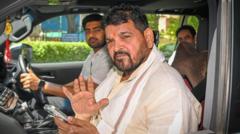In a groundbreaking surgery, doctors in Delhi successfully removed a rare parasitic twin from a 17-year-old boy’s abdomen. This complex procedure has opened new possibilities for the teen, who suffered social stigma due to his condition.
Rare Surgical Triumph: Indian Boy Undergoes Successful Removal of Parasitic Twin

Rare Surgical Triumph: Indian Boy Undergoes Successful Removal of Parasitic Twin
Surgeons in Delhi achieve remarkable feat by excising a parasitic twin from a 17-year-old boy, offering a new lease on life.
In a remarkable medical breakthrough, a team of surgeons in New Delhi, India, has successfully performed a rare surgery on a 17-year-old boy to remove a parasitic twin attached to his abdomen. Parasitic twins, which are underdeveloped conjoined twins reliant entirely on their host for survival, are extremely rare, with fewer than one case per 100,000 births.
The teenage patient had a fully formed set of limbs, including legs, buttocks, and external genitalia, which weighed nearly 15 kg. Dr. Asuri Krishna, the lead surgeon of the complex procedure at Aiims Hospital, mentioned that such procedures have primarily been documented in younger children, making this case particularly unique and challenging.
"Only around 40-50 cases of parasitic twins are recorded in medical literature," Dr. Krishna stated. Due to the scarcity of guidance available, the surgeons relied heavily on their intuition, combined with their expertise and knowledge to navigate the complexities of the case.
The formation of parasitic twins occurs when one fetus partially develops while attached to another. For this boy, the parasitic twin was connected to his chest vessel, though it had limited connections to vital organs like the liver and kidneys. Additionally, doctors discovered a large cyst in the teen's abdomen during pre-surgical scans.
The two-stage surgery lasted approximately two and a half hours. The initial step involved the careful removal of the parasitic twin, followed by extracting the cystic mass enveloping surrounding organs. The surgical team, comprising radiologists, anaesthetists, and plastic surgeons, had to meticulously separate a complex web of blood vessels, nerves, and tissues without harming the host's organs.
During the surgery, the teen's blood pressure dropped as blood flow shifted toward the parasitic twin. However, the team quickly stabilized him and ensured that the procedure was successful. Just four days post-operation, the boy was discharged in good health, free from complications.
His unusual condition had subjected him to ridicule and isolation within his community in Unnao, Uttar Pradesh, impacting his mental well-being and causing him to drop out of school. Expressing his joy post-surgery, the 17-year-old remarked, “I hope to study and get a job. A new world has opened up to me,” as he looked forward to living an active life unburdened by his past.





















